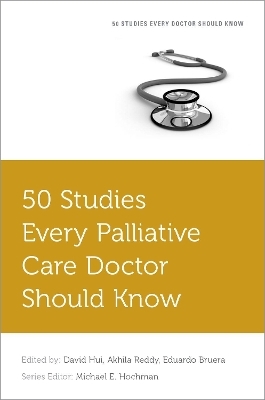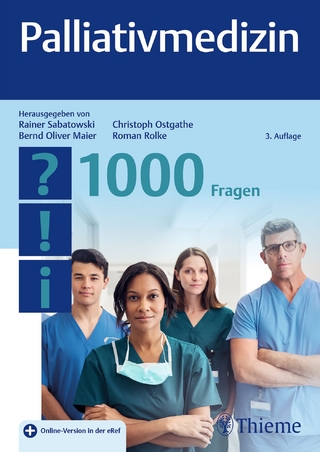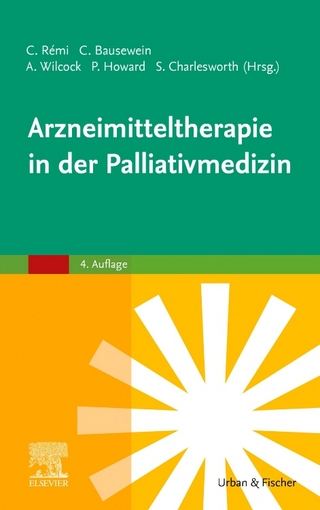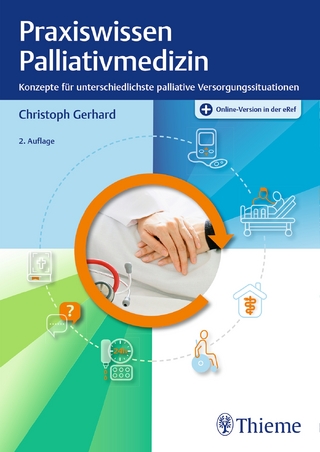
50 Studies Every Palliative Care Doctor Should Know
Oxford University Press Inc (Verlag)
978-0-19-065861-8 (ISBN)
Dr. David Hui, MD, MSc is an Associate Professor in the Department of Palliative Care, Rehabilitation, and Integrative Medicine, with a joint appointment to the Department of General Oncology at The University of Texas MD Anderson Cancer Center, Houston, Texas. He completed his medical oncology training at the British Columbia Cancer Agency in British Columbia, Canada, and completed a palliative oncology fellowship at the University of Texas MD Anderson Cancer Center. His research interests include integration of supportive/palliative care into oncology practice, clinical trials investigating interventions for symptom control, and prognostication. Dr. Akhila Reddy, MD is an Associate Professor in the department of Palliative, Rehabilitation, and Integrative Medicine at The University of Texas MD Anderson Cancer Center in Houston, Texas. Her research interests include opioids, opioid induced neurotoxicity and pain management in cancer patients. She has authored several publications determining safe and effective opioid rotation ratios for pain management in cancer patients. One of the pioneering members of the hospice and palliative medicine movement in North America, Dr. Eduardo Bruera, MD has educated generations of hospice and palliative medicine clinicians. Founder of two of the leading palliative care programs in North America (in Edmonton, Canada and The University of Texas MD Anderson Cancer Center), his impact extends far beyond his direct trainees, many of whom have gone on to lead programs of their own nationally and internationally. Mentor to innumerable observers, visiting scientists, and mentees, he has contributed to the development of hospice and palliative medicine clinical and research expertise across the globe. A prolific physician scientist and sought after speaker, he has created an enduring legacy for the field.
Section 1: Palliative Care
Chapter 1: Early Palliative Care for Patients with Metastatic Non-Small Cell Lung Cancer
Nathan A. Gray and Thomas W. LeBlanc
Chapter 2: Early Palliative Care for Patients with Advanced Cancer
David Hui
Chapter 3: Nurse Led Palliative Care for Advanced Cancer Patients
Emily J. Martin and Eric J. Roeland
Chapter 4: Benefits of Early Palliative Care to Informal Family Caregivers
Emily J. Martin and Eric J. Roeland
Chapter 5: The Optimal Delivery of Palliative Care
Jaclyn Yoong and Peter Poon
Chapter 6: Availability and Integration of Palliative Care at US Cancer Centers
Pedro Pérez-Cruz and Alfredo Rodríguez-Núñez
Chapter 7: Cost Savings Associated with Palliative Care
Breffni Hannon
Section 2: Sympton Assessment and Management
Chapter 8: Changes in the Last Months of Life
Jaclyn Yoong and Fiona Runacres
Chapter 9: The Edmonton Symptom Assessment System (ESAS)
Breffni Hannon
Chapter 10: Reversibility of Delirium in Palliative Care
Tiffany Shaw and Eric Prommer
Chapter 11: Multi-Component Intervention to Prevent Delirium in Hospitalized Older Patients
Peter Lawlor
Chapter 12: Haloperidol, Chlorpromazine, and Lorazepam for Delirium
Anna Cecilia Tenorio and Maxine de la Cruz
Chapter 13: Decompressive Surgery for Malignant Spinal Cord Compression
Esmé Finlay and Diaa Osman
Chapter 14: Opioid Rotation for Toxicity Reduction
Anna Cecilia Tenorio and Akhila Reddy
Chapter 15: Duloxetine for Chemotherapy-Induced Peripheral Neuropathy
Rebecca Burke and Akhila Reddy
Chapter 16: Effects of Morphine on Dyspnea
Arif H. Kamal and Jason A. Webb
Chapter 17: Palliative Oxygen Versus Room Air for Refractory Dyspnea
Jason A. Webb and Arif H. Kamal
Chapter 18: Exercise for the Management of Cancer-Related Fatigue
Lynn A. Flint and Eric Widera
Chapter 19: Reduction of Cancer-related Fatigue with Dexamethasone: a Double-Blind, Randomized, Placebo-Controlled Trial in Patients with Advanced Cancer
Chirag A. Patel
Chapter 20: Parenteral Hydration in Patients with Advanced Cancer
Carlos Eduardo Paiva and Bianca Sakamoto Ribeiro Paiva
Chapter 21: Enteral Tube Feeding Dysphagic Stroke Patients
Francisco Loaiciga and Rony Dev
Chapter 22: Feeding Tube and Survival Among Patients With Severe Cognitive Impairment
Claudio Adile
Chapter 23: Parenteral Nutrition in Cancer Patients Undergoing Chemotherapy
Francisco Loaiciga and Rony Dev
Chapter 24: Docusate and Sennosides for Constipation
Shalini Dalal
Chapter 25: Treatment of Opioid-Induced Constipation in Advanced Illness
Donna S. Zhukovsky
Chapter 26: Octreotide for Malignant Bowel Obstruction
Shalini Dalal
Section 3: Psychosocial Aspects of Care and Communication
Chapter 27: Prevalence of Mood Disorders in Patients with Cancer
Linh Nguyen
Chapter 28: Dignity Therapy for Patients Near the End-of-Life
Marvin Omar Delgado-Guay
Chapter 29: Association between Spirituality/Religiosity and Quality of End-of-Life Care
Marvin Omar Delgado-Guay
Chapter 30: The Study to Understand Prognoses and Preferences for Outcomes and Risks of Treatments (SUPPORT)
Nathan A. Gray and Thomas W. LeBlanc
Chapter 31: Doctors' Prognostic Accuracy in Terminally Ill Patients
Anjali Desai and Andrew S. Epstein
Chapter 32: Prognostic Disclosure to Patients with Advanced Cancer
David Hui
Chapter 33: Expectations about Effects of Chemotherapy in Patients with Advanced Cancer
Rajiv Agarwal and Andrew S. Epstein
Chapter 34: Physician Message and Patient's Perception of Compassion
Lynn A. Flint and Eric Widera
Section 4: End of Life Care and Planning
Chapter 35: Association between Advance Directives and Quality of End-of-Life Care
Donna S. Zhukovsky
Chapter 36: Outcomes Associated with End-of-Life Discussions
Masanori Mori
Chapter 37: End-of-Life Discussions and Aggressiveness of Care Received Near Death
Yael Schenker and Justin Yu
Chapter 38: A Communication Intervention in the Intensive Care Unit
Lori Olson and Christian T. Sinclair
Chapter 39: Clinical Signs of Impending Death in Cancer Patients
Masanori Mori
Chapter 40: Factors Considered Important at the End of Life
Ravi B. Parikh and Oreofe O. Odejide
Chapter 41: Quality End-of-Life Care: Patients' Perspectives
Jesse A. Soodalter and Yael Schenker
Chapter 42: Family Perspectives on Aggressive End-of-Life Care
Ravi B. Parikh and Oreofe Odejide
Chapter 43: Family Perspectives on End-of-Life Care at the Last Place of Care
Esmé Finlay and Erin FitzGerald
Chapter 44: Liverpool Care Pathway for Hospitalized Cancer Patients
Carlos Eduardo Paiva and André Filipe Junqueira dos Santos
Chapter 45: Palliative Sedation Therapy and Survival
Joseph Arthur
Chapter 46: What Patients and Families Want to Know About Hospice
Regina Mackey and Kimberson Tanco
Chapter 47: The Impact of Hospice on Mortality of Widowed Spouses
Kimberson Tanco and Regina Mackey
Chapter 48: Attitudes and Desires of Terminally Ill Patients Regarding Euthanasia and Physician-Assisted Suicide
Yu Jung Kim
Chapter 49: Factors associated with Outcomes of Cardiopulmonary Resuscitation
Dutt Mehta and Eric Prommer
Chapter 50: Influence of Survival Probability on Preference for CPR
Christian T. Sinclair and Allison E. Jordan
| Erscheinungsdatum | 10.07.2018 |
|---|---|
| Reihe/Serie | Fifty Studies Every Doctor Should Know |
| Verlagsort | New York |
| Sprache | englisch |
| Maße | 231 x 155 mm |
| Gewicht | 522 g |
| Themenwelt | Medizin / Pharmazie ► Medizinische Fachgebiete ► Palliativmedizin |
| ISBN-10 | 0-19-065861-4 / 0190658614 |
| ISBN-13 | 978-0-19-065861-8 / 9780190658618 |
| Zustand | Neuware |
| Informationen gemäß Produktsicherheitsverordnung (GPSR) | |
| Haben Sie eine Frage zum Produkt? |
aus dem Bereich


